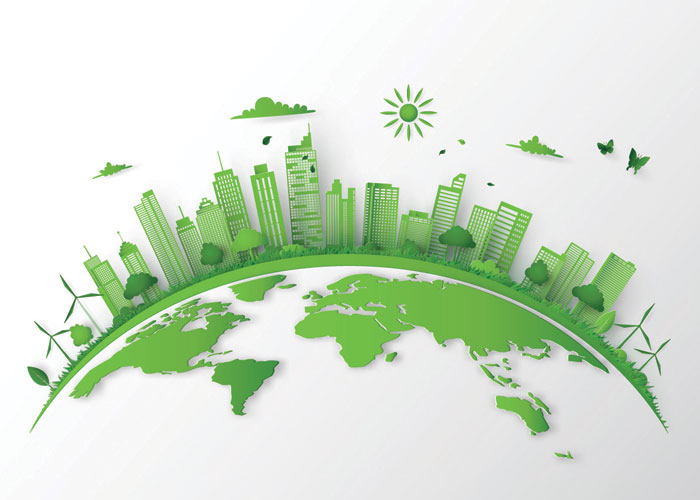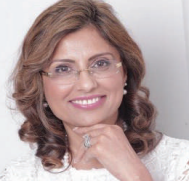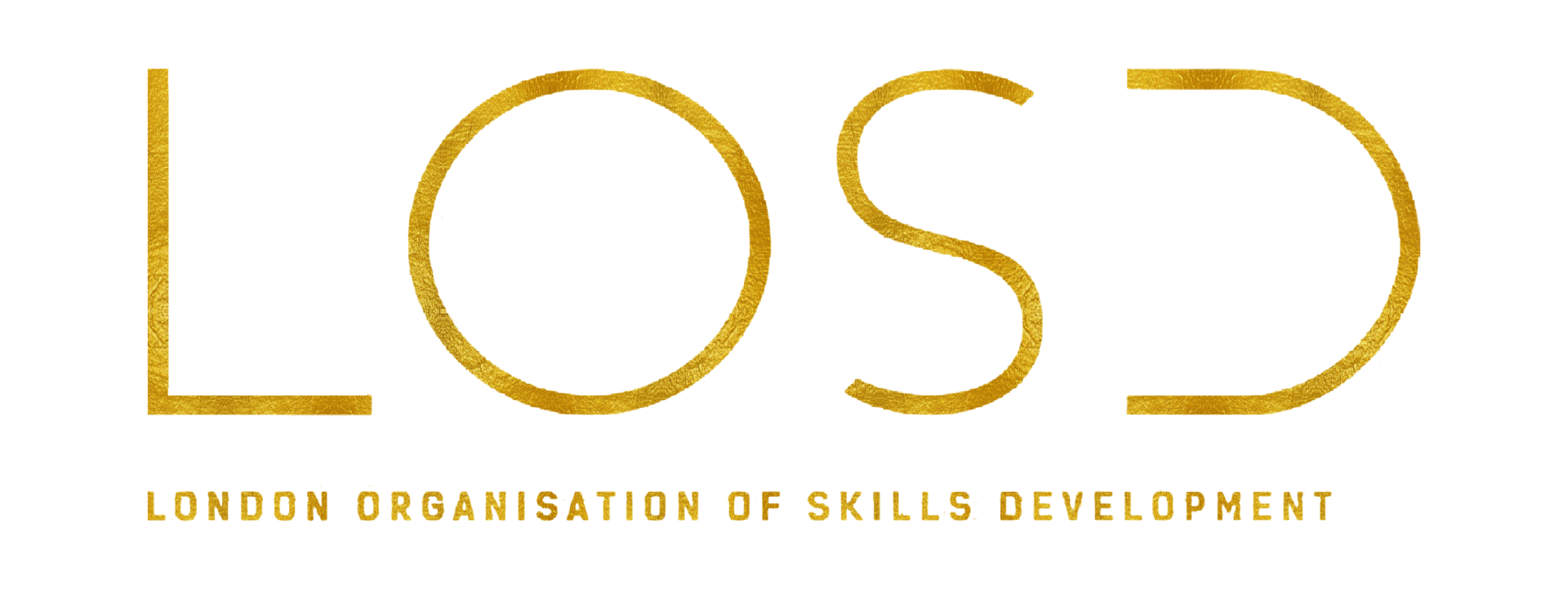Research Objectives:
This study aims to explore how higher education institutions (HEIs) can be reimagined in 2024 to empower students and contribute to a sustainable future.
Keywords:
Higher Education, Sustainability, Critical thinking, Student Empowerment
Bio
Prof. Dr. Parin Somani, Director & CEO of London Organisation of Skills Development (LOSD). She is a distinguished Academic Scholar, three times TEDx Speaker, and Author, honoured the title of Winner of Mrs Universe 2022, Winner of Enigma Mrs. World 2022 and several others. With 2 Academic and 6 Honorary Doctorates, she’s a multi-award-winner and humanitarian. She is a prolific author of 21 books, and a record-breaker recognised in Guinness World Records and multiple prestigious record books. She was invited to deliver a Keynote Speech at Harvard University, Cambridge University and many more. In her global travels to 127 countries, Prof. Dr. Parin Somani tirelessly contributes to education, women empowerment, and youth development.
Abstract
This study aims to explore how higher education institutions (HEIs) can be reimagined in 2024 to empower students and contribute to a sustainable future.
A systematic review of recent academic literature focusing on higher education pedagogy, curriculum development, and student development in the context of sustainability was conducted. Additionally, the review analysed reports and publications from leading sustainability organisations and higher education institutions.
The review identified several key areas for progress within HEIs. Firstly, a need for curriculum reform, emphasising the integration of sustainability principles across all disciplines. Secondly, the importance of fostering critical thinking and problemsolving skills through innovative pedagogies was highlighted. Thirdly, prioritising student well-being and mental health through robust support systems was identified as crucial for fostering resilience. Finally, the review found that experiential learning opportunities such as internships and community engagement projects were vital for fostering student agency and impact.
Integrating sustainability across curricula, fostering critical thinking, prioritising student well-being, and providing experiential learning opportunities are crucial for empowering students. By implementing these changes, HEIs can transform into catalysts for a sustainable future. Students graduating in 2024 and beyond, equipped with these skills and experiences will be well-positioned to address complex global challenges and contribute to a more resilient world. This reimagined approach to higher education has the potential to unlock student potential for a sustainable future.
Introduction
Higher education is at a pivotal moment in history. The backdrop of this moment is shifting from reactive approaches to more visionary goals. Sustainable development globally and locally is becoming a priority as governments take up the challenge, validate their positions, and initiate a strategic response at regional and national levels, reflecting local priorities.
Universities have an essential role in public life and community development. They foster independent, critical, and diverse perspectives on issues affecting social, political, economic, and environmental aspects of life. However, public universities are at a crossroads. As mass education democratizes access to higher education, this could also lead to increased instrumentalism and reductions in the ability of universities to act as profound agents of democratization, social development, citizenship, and equity.
As society strives for ecological sustainability, social justice, and a more equitable distribution of material resources, the role of universities must be critically assessed. They need to take up the challenge of affecting a radical transformation of society from the internal structures built up over centuries. All sociopolitical institutions have consider how the potential of public universities can be unlocked to contribute to social and political changes towards improving the world, its resources, and society. Attention is turned to how the universities might major challenges to confront, including the development of a new moral and political economy, changing patterns of governance, and an evolution towards more ethical, expansive, and inclusive power. These challenges will only be addressed on the basis of equally profound transformations of the institutions that shape consciousness through knowledge production and dissemination. Figure 1 depicts the integration of sustainability principles into higher education curricula.
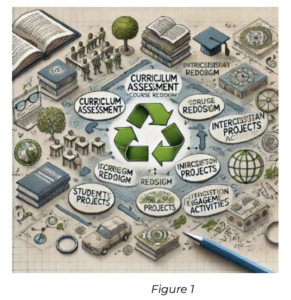
With these intentions in mind, a proposal is made to be actively reimagined to embrace the potential of humanity rather than retreat into the privileged and the instrumental. The argument is made that thinking and acting publicly are university responsibilities, and there must be a world university movement that asserts the universal contribution of public knowledge and takes up the challenge of its global regulation and democratization.
Aim
Higher education is a vital and powerful force for good in society. It positively impacts the economy, equality, health, happiness, and well-being. Those with degrees earn more and are less likely to be unemployed. Yet, 90% of the world’s population live in developing countries, where only 1% of young adults have a tertiary qualification. An unprecedented convergence of crises, from climate change to conflict, is resulting in disruption and destruction, resulting in higher education having an ever-greater obligation to promote peace, justice, and sustainable development globally. Building on the commitments of the 2030 Agenda, the sustainable development goals, and the new higher education institutions 4-5-6-7- 8-9-10, this document begins to address the questions: “What would a higher education for a sustainable future look like?” and “How can it be reimagined and unlocked for all?”
In response to the rapid and reiterative changing global context, the education for a sustainable future vision presented here aims to provoke critical dialogue and explore collaborative actions by higher education and partners across public, private, civil society, local and global sectors. Importantly, it acknowledges a global north/south power dynamic resulting in unequal access to and benefit from technology. Technology should be regarded as a double-edged sword that empowers as well as impoverishes. Information and communication technologies (ICTs) are an enabler of access, at the same time, a barrier to a growing divide as they play a pivotal role in the production and dissemination of knowledge.
The rapidly enhancing artificial intelligence (AI) capability poses another game-changing challenge to the existing form and norm of higher education. Technology development and adoption is race-driven to grow in scale and scope. Ethical framework and governance lag behind regulating the impact of AI in society. There is a need for holistic consideration of people, purpose, planet, prosperity, and peace in a higher education context reimagined; reimagining the education for sustainable future vision; rethinking the role of technology; and redefining the emphasis on global solidarity and local actions. There is excitement towards the worldwide imagination of education for a sustainable future. What higher education would mean and look like if everyone on earth was nurtured equally and inclusively similarly to the “richest of the rich” as epitomised by the worldrenowned Ivy League institutions?
Methodology
The methodology employed to explore the reimagining of higher education in 2024 encompasses a systematic framework that integrates qualitative and quantitative methods, data collection techniques, and other relevant processes. As highlighted by (Beecroft & C. Schmidt, 2015), the scenario method shows high potential for use in Higher Education in Sustainability (HES). This method involves constructing and analysing alternative future developments to support present decisionmaking. Didactical reconstruction of the scenario method is essential to develop appropriate forms of teaching in higher education, allowing students to cultivate fundamental reflexive competencies in addressing the future in ways relevant for both sustainability and education.
Results and Discussion
The results and discussion section presents the culmination of the examination of reimagining higher education in 2024. It encompasses the findings derived from the analysis and combines them with in-depth conversations, interpretations, and contextualisation’s. This section delves into various aspects of the reformation and its implications, offering insights from leaders and students about the future of higher education (Andrew Doiron, 2017). It also discusses the expectations of students regarding the role of technology in higher education, emphasising the need for technologies that enable students to become co-creators in their education processes (Romenska, 2009). The section highlights the emergence of challenges faced by higher education institutions in the face of a changing social, economic, technological, and political context, prompting the need for a revaluation of assumptions and the development of a vision for the future.
3.1. Curriculum Reform in Higher Education
Curriculum reform in higher education is vital for preparing students for a sustainable future. The proposed changes aim to adapt learning frameworks, course structures, and knowledge delivery methods to foster relevant skills and competencies. Research has shown that transformative education involves engaging the whole person and affecting change in deep levels of values and beliefs (Winter et al., 2015). This suggests that higher education institutions need to create opportunities for students to experience higherlevel transformation by linking personal and professional spheres. Additionally, there is a growing trend towards nonstandard curricula, including flexible, personalised, workbased, and online structures, as well as increased collaborative provision, which presents both implications and potential incompatibilities for future curricula (Peach, 2012).
3.2. Fostering Critical Thinking and Problem-Solving Skills
To foster critical thinking and problem-solving skills in higher education, institutions are implementing various initiatives and strategies. One such initiative is the NK program at North Carolina State University, which aims to transform the culture of teaching and learning from teacher-centered to student centered instruction. This approach emphasises higher order thinking and encourages faculty to engage in intensive development, create discipline-specific activities, and provide feedback on students’ thinking skills. The primary outcome is for students to apply critical and creative thinking skills in problem-solving, addressing the need for graduates to be prepared for career challenges related to these skills (Allen et al., 2019). In addition, the use of heuristic evaluation methods is being explored to connect online platforms with the development of critical thinking, creativity, and problem-solving skills in students. This approach allows educators to understand the learning system as a whole and align it with the needs of twenty-first century skills (Nussbaum et al., 2021). These initiatives collectively contribute to the cultivation of essential skills that enable students to meaningfully contribute to a sustainable future.
3.3. Prioritising Student Well-being and Mental Health
(Goodman, 2017) emphasises the importance of universal mental health promotion through curricular changes, wellness centres, and integration of wellness into student programming. This approach communicates an institutional priority of mental health and wellness, providing free education or resources, while also emphasising the need for supervised skills practice and supportive relationships. Additionally, (Spencer Kilarski, 2019) highlights the frustration and overwhelming academic expectations experienced by students, indicating the need for structural changes in academic calendars to support student relaxation and study time. These insights underscore the significance of addressing student welfare and mental health challenges within the higher education system to create a supportive and conducive learning environment. Figure 2 depicts the components of a robust support system for student well-being in higher education.
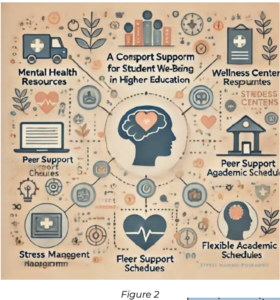
Conclusion
If the challenges facing humanity are to be met, a concerted global effort must be made. To achieve this, universities must take the lead and ensure they are fit for purpose. As agents of social and economic change, they have no moral choice otherwise. As a starting point, the Universitas 21 (U21) Global Ingenium Summit in 2024 will take a “blank sheet of paper” approach to the higher education landscape. Participants will imagine a higher education world where they can take decisions uninhibited by cost, convention, or responsibility. They will design a new system preferably for the world at large, but at least for thir home countries. Once there is something tangible, then the real work starts – to deliver it against the millstone s of feasibility, affordability, and practicality. A U21 Global Summit is proposed to explore ow ingenuity might unlock the potential for a sustainable future and reimagine a higher education system that is fit for purpose in 2024. Each university in U21 is invited to share experiences and reflections that contribute to a full programme of conversations and discussions. Vice Chancellors, Presidents and other leaders from U21 institutions will meet HSBC’s Chief Economist, Greg Fyfe, and the World Future Society’s Jim Auckerman. Together, they will examine the future of the world and the consequences for higher education. Fireside chats with thought leaders from around the world will complement the formal discussions. Finally, Summit delegates will combine science, technology, leadership, imagination and creativity through collaborative workshops in business environments such as Idea Farm and the Silicon Docks.
References
Beecroft, R. & C. Schmidt, J. (2015). Method-Based Higher Education in Sustainability: The Potential of the Scenario Method. [PDF]
Andrew Doiron, J. (2017). A grounded theory of school of education futures. [PDF]
Romenska, S. (2009). The learning technologies of the future: technologies that learn?. [PDF]
Winter, J., Cotton, D., Hopkinson, P., & Grant, V. (2015). The University as a Site for Transformation around Sustainability. [PDF]
Peach, S. (2012). Understanding the Higher Education Curriculum in the 21st century. [PDF]
Allen, T., Queen, S., GallardoWilliams, M., Parks, L., Auten, A., & Carson, S. (2019). Building a Culture of Critical and Creative Thinking. Creating and Sustaining Higher-Order Thinking as part of a Quality Enhancement Plan. [PDF]
Nussbaum, M., Barahona, C., Rodriguez, F., Guentulle, V., Lopez, F., Vazquez-Uscanga, E., & Cabezas, V. (2021). Taking critical thinking, creativity and grit online. ncbi.nlm.nih.gov
Goodman, L. (2017). Mental Health on University Campuses and the Needs of Students They Seek to Serve. [PDF]
Spencer Kilarski, K. (2019). Can I Lend a Hand? Investigating the Promotion of Student Resiliency in a University Setting. [PDF]

